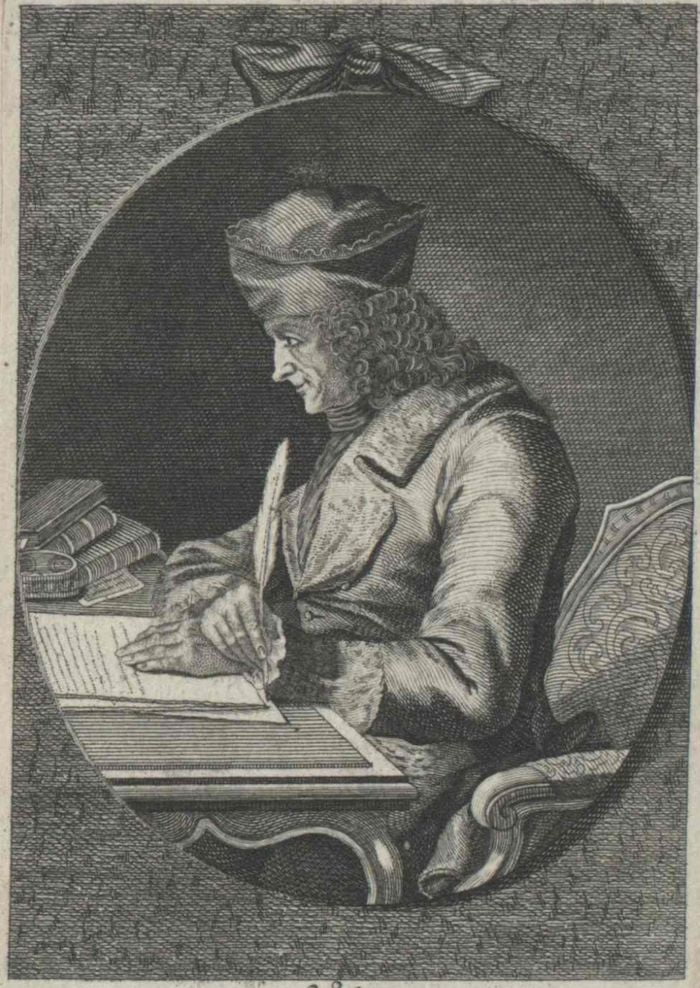Petrified with astonishment, and his heart broken with grief, Memnon returns homeward in despair. As he was about to enter his house, he is repulsed by a number of officers who are carrying off his furniture for the benefit of his creditors: he falls down almost lifeless under a plane tree. There he finds the fair dame, of the morning, who was walking with her dear uncle; and both set up a loud laugh on seeing Memnon with his plaster.
The night approached, and Memnon made his bed on some straw near the walls of his house. Here the ague seized him, and he fell asleep in one of the fits, when a celestial spirit appeared to him in a dream.
It was all resplendent with light: it had six beautiful wings, but neither feet nor head nor tail, and could be likened to nothing. “What art thou?” said Memnon. “Thy good genius,” replied the spirit. “Restore to me then my eye, my health, my fortune, my reason,” said Memnon; and he related how he had lost them all in one day.
“These are adventures which never happen to us in the world we inhabit,” said the spirit. “And what world do you inhabit?” said the man of affliction. “My native country,” replied the other, “is five hundred millions of leagues distant from the sun, in a little star near Sirius, which you see from hence.” “Charming country!” said Memnon. “And are there indeed no jades to dupe a poor devil, no intimate friends that win his money, and knock out an eye for him, no fraudulent bankrupts, no satraps that make a jest of you while they refuse you justice?”
“No,” said the inhabitant of the star, “we have nothing of what you talk of; we are never duped by women, because we have none among us; we never commit excesses at table, because we neither eat nor drink; we have no bankrupts, because with us there is neither silver nor gold; our eyes cannot be knocked out because we have not bodies in the form of yours; and satraps never do us injustice because in our world we are all equal.” “Pray, my lord,” then said Memnon, “with¬out women and without eating how do you spend your time?”
“In watching,” said the genius, “over the other worlds that are entrusted to us; and I am now come to give you consolation.” “Alas!” replied Memnon, “why did you not come yesterday to hinder me from com¬mitting so many indiscretions?” “I was with your elder brother Has- san,” said the celestial being. “He is still more to be pitied than you are. His Most Gracious Majesty the Sultan of the Indies, in whose court he has the honor to serve, has caused both his eyes to be put out for some small indiscretion; and he is now in a dungeon, his hands and feet loaded with chains.”
Perfect philosopher
“ `Tis a happy thing truly,” said Mem¬non, “to have a good genius in one `s family, when out of two brothers one is blind of an eye, the other blind of both: one stretched upon straw, the other in a dungeon.” “Your fate will soon change,” said the animal of the star. “It is true, you will never recover your eye, but, except that, you may be sufficiently happy if you never again take it into your head to be a perfect philosopher.” “It is then impossible?” said Memnon. “As impossible as to be perfectly wise, perfectly strong, perfectly powerful, perfectly happy. We ourselves are very far from it. There is a world indeed where all this is possible; but, in the hundred thousand millions of worlds dispersed over the regions of space, every¬thing goes on by degrees.
There is less philosophy, and less enjoyment on the second than in the first, less in the third than in the second, and so forth till the last in the scale, where all are completely fools.” “I am afraid,” said Memnon, “that our little terraqueous globe here is the madhouse of those hundred thousand millions of worlds of which Your Lordship does me the honor to speak.” “Not quite,” said the spirit, “but very nearly; everything must be in its proper place.” “But are those poets and philosophers wrong, then, who tell us that everything is for the best?” “No, they are right, when we consider things in relation to the gradation to the whole universe.” “Oh! I shall never believe it till I recover my eye again,” said poor Memnon.
Read More about Apologia of St John Damascene Against those who Decry Holy Images Part 76








